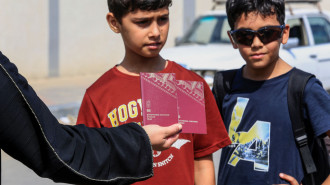As Israel’s genocide persists, the sea is main refuge for Palestinians in Gaza
Recently, thousands of Palestinians rushed to the sea along the shores of the southern parts of the Gaza Strip to escape the increasing temperature of the oncoming summer season as well as from ongoing Israeli attacks.
Separately speaking to The New Arab, Palestinians in the besieged coastal enclave said that they lost all the safe shelters, which forced them to think of the sea as an open area that may not witness any more attacks by Israeli forces.
Others believe that the sea would be the only outlet for them, their families, and their children to alleviate daily pressures from the war.
Since the outbreak of Israel's war seven months ago, Mohammed al-Hayek has lived in a temporary tent set up in the city of Deir al-Balah in the centre of Gaza.
"When the war erupted, the weather was hot, and living inside the tent helped us to find a safe place (...). But now, everything has changed. Mostly, the hot summer has arrived, and no one can stay inside the tent during the day," the 45-year-old father of five said.
On such days, the middle-aged man recalls, "I used to manage various trips to my children to spend fun times on the beach, but now my children and I try to escape from the Israeli attacks and summer hot into the sea."
"Everything in our lives has turned upside down, and we do not have even the right to decide where we can go," he added.
Al-Hayek also expressed fears that the Israeli army may attack Palestinians seeking shelter on the beach under the pretext that they are eliminating the Hamas militants in the territory.
"All the time, Israel has its own lies to tell the world that it attacks Hamas, but the truth is that it attacks us (the innocent civilians) only," he stressed.
Last October, the Israeli army launched a large-scale bloody war on the besieged coastal enclave after Hamas, the Islamist group ruling the territory, led an attack on Israeli military bases and civilian settlements within and around the Gaza envelope. The war by Israel has killed about 34,083 Palestinians and wounded about 77,000 others.
Israeli forces have persisted in attacks on the whole coastal enclave, forcing more than 1.9 million people to be displaced in the southern parts of the Gaza Strip and live in inhumane conditions.
Israel's war also enabled a catastrophic and stifling humanitarian crisis that included severe shortages of food, water, and medicine.
Meanwhile, the increasing temperatures compounded the difficulties faced by the displaced Palestinians, forcing many of them to head towards the sea, the only outlet for the displaced in the Gaza Strip despite the bombing and destruction.
Khitam Abu Shahala rushed with her family to establish a tent on the beach near Deir al-Balah to be close to the water so she could wash laundry and dishes daily.
"Because of the high temperature of the tents, I was afraid of losing my kids, as they would be sick from the insects and mosquitoes that spread in the tent. In addition, water is not constantly available. Here by the sea, children can swim every day," she remarked to TNA.
"When the temperature began rising, I brought my family to the sea so my children could bathe and wash our clothes. For a month, we had not been able to provide fresh or salty water in the camp for us to bathe," Ismail Abu Ajwa, another displaced Palestinian, said to TNA.
"The seashore was a refuge for our children. They needed psychological support from the impact of the Israeli war on the Gaza Strip due to the fear, anxiety and psychological trauma they faced. On the seashore, the children ran, laughed and played," he added.
"I came to the sea to forget the war for a little bit, and to relax, and to forget the small, narrow tent in which there were mosquitoes and insects, and I was suffocating from them, so here I felt a little at ease and forgot the worry that we live in," Salah Abu Salah, a Palestinian displaced from Khan Younis, said to TNA.
For Abu Salah, the most important thing about the scene of the locals in the seashore is that "it provokes Israelis and delivers a clear message to the Israelis that the Palestinian people will never die or end their lives just because of the unjust war."




 Follow the Middle East's top stories in English at The New Arab on Google News
Follow the Middle East's top stories in English at The New Arab on Google News
![People gathered around the rubble of destroyed houses to search for survivors [Getty]](/sites/default/files/styles/image_330x185/public/2024-11/GettyImages-2184733820.jpg?h=199d8c1f&itok=NiM1LO2f)

